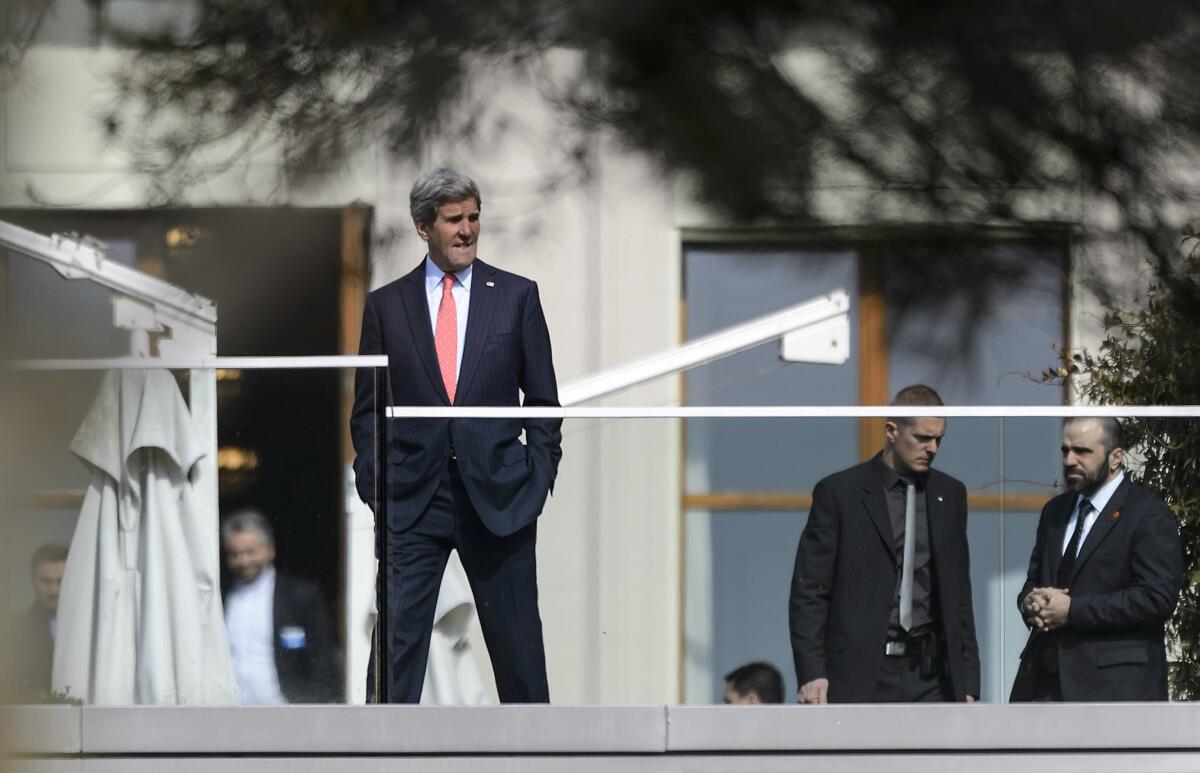Iran raises issue of GOP letter in nuclear talks

- Share via
Reporting from Lausanne, Switzerland — A defiant letter from Senate Republicans to Iran’s leaders is complicating international negotiations to end a 12-year impasse by imposing strict limits on Iran’s nuclear program in exchange for easing economic sanctions.
As U.S. and Iranian officials began a weeklong push to complete the outline of an agreement, Tehran repeatedly demanded an explanation of the letter written by freshman Sen. Tom Cotton (R-Ark.) and signed by 47 of the 54 Republican senators, a senior Obama administration official said.
The open letter, released last week, warned Iranian leaders that any accord reached by President Obama without congressional approval could be voided “with the stroke of a pen” by a future president, and that future Congresses could modify the agreement “at any time” if lawmakers consider it too lenient.
Iranian officials raised the letter in a negotiating session Sunday, and again Monday, according to the administration official. The two sides met behind closed doors for five hours in a luxury hotel here on the shores of Lake Geneva.
“These kinds of distractions are not helpful when we’re talking about something so serious,” said the official, who declined to be identified under ground rules set by the administration.
The official declined to say how U.S. officials responded, or provide other details of the discussions. The official said the contentious issue didn’t stop the two sides from trying to resolve other differences still under negotiation two weeks before a self-imposed deadline.
Appearing Sunday on CNN, Senate Majority Leader Mitch McConnell (R-Ky.) defended the letter and warned that the administration is negotiating a “very bad” nuclear deal. Cotton said he had no regrets about the letter, saying the fierce criticism it sparked showed that Obama wasn’t negotiating “the hardest deal possible.”
Secretary of State John F. Kerry met with Iranian Foreign Minister Mohammad Javad Zarif here Monday after separate talks by senior diplomats and technical experts Sunday.
The five permanent members of the United Nations Security Council — the United States, France, Britain, Russia and China — plus Germany have been negotiating as a group for about 18 months to try to restrain Iran’s nuclear program, and thus reduce the chance of a nuclear arms race or a new war in the Middle East.
The two sides initially had sought to complete a deal by last July, but that deadline was pushed back. Diplomats now aim to finish an outline this month and then work out the technical details and drafting of a final nuclear accord by June 30. Both sides have said they won’t seek further extensions.
Both sides would like to complete the framework this week, if possible, so they can adjourn before the Iranian New Year celebration, which begins March 21. But it’s not certain if that will occur.
Officials have said the deal under consideration would see Iran freeze most of its nuclear enrichment program for at least a decade, with restrictions then lifted over a further five years or so. In exchange, the U.S. and other countries would gradually lift economic sanctions but maintain monitoring of nuclear facilities.
Iran denies it plans to build a nuclear weapon, and says it wants to enrich uranium to generate electricity and for other peaceful purposes only.
Cotton’s letter has further inflamed an impassioned debate in Washington over the negotiations. Critics say concessions by the U.S. and the other world powers would not prevent Iran from building a nuclear weapon one day should it choose to do so.
White House officials defend the diplomatic push as the best way to rein in Iran’s nuclear ambitions. And they have sharply criticized the lawmakers’ letter as improper interference in the president’s prerogative to negotiate agreements and conduct foreign policy.
The U.S. and Iran appear to have made progress on core issues in recent weeks, and some analysts say a deal could be announced any time. But several key issues appear unresolved, including how quickly economic sanctions will be removed, limits on Iran’s future nuclear research and development, and long-term international monitoring of nuclear activities.
The senior administration official sought to lower expectations, saying those differences could still derail a deal. The official said it’s also undecided how much detail the two sides will publicly release if they reach enough of an understanding this month to seek a final three months of talks.
“Obviously, there will have to be detailed classified consultations with Congress” and other governments, the official said.
“We will of course have to say something” to the public, the official said. “But how detailed, at what level, in what way … we haven’t figured all that out yet.”
Many outside analysts argue that the administration should release as many details as possible to build public support for a deal that already faces intense skepticism.
Kelsey Davenport of the nonpartisan Arms Control Assn. urged the administration to release a detailed document. A deal “with no details is a tougher sell,” she said, though she said the administration still could win enough support to continue the talks.
Senators from both parties have vowed to approve legislation that could trigger new sanctions on Iran if negotiators don’t reach a breakthrough.
Sen. Mark Steven Kirk (R-Ill.) and Sen. Robert Menendez (D-N.J.) have co-sponsored legislation that would automatically impose new sanctions from June 30 if no final deal is reached. Iran has said new sanctions would sink any possible deal.
More to Read
Sign up for Essential California
The most important California stories and recommendations in your inbox every morning.
You may occasionally receive promotional content from the Los Angeles Times.











